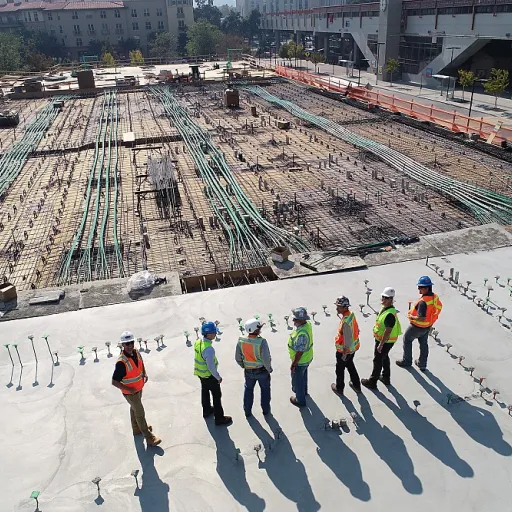
Understanding the Importance of Feedback Forms
The Critical Role of Feedback Forms in the Interview Process
In New Zealand's competitive job market, ensuring an efficient and effective hiring process is essential. Feedback forms play a pivotal role in enhancing this process, particularly during drafter interviews. They serve as a systematic means for evaluating candidates, ensuring that hiring managers can make informed decisions based on well-structured feedback. Feedback forms provide a platform for interviewers to systematically record their observations and insights about a candidate’s skills and experience. By doing so, they not only help in selecting the most suitable candidate for the job but also contribute to the overall candidate experience. A thoroughly developed interview feedback form can ensure a consistent approach across multiple interviews, thereby reducing biases and promoting fairness. Having a structured evaluation process in place also supports the recruitment process by allowing hiring managers to compare candidates objectively. This is particularly relevant in industries where specific technical skills are crucial, such as in drafter roles. Although each drafter's position may require unique skills, a well-designed feedback form can be tailored to address these needs without compromising on the comprehensive assessment process. For New Zealand companies, the importance of providing effective feedback forms cannot be overstated. By integrating best practices into these forms, organizations can avoid common mistakes and leverage insights to continually improve their hiring strategy. Furthermore, as at-will employment becomes a consideration for New Zealand companies, well-documented feedback forms offer a layer of protection and transparency in the recruitment process. Ultimately, investing in comprehensive and effective feedback forms is a strategic move that will help organizations not only streamline their hiring process but also enhance the overall candidate experience. This is just one aspect of the broader need for structured interviews and evaluation methods. Understanding these elements sets the foundation for successful and efficient recruitment in today’s dynamic hiring landscape.Key Elements of a Drafter Interview Feedback Form
Essential Components for Comprehensive Feedback
Creating a well-structured drafter interview feedback form is crucial for enhancing the recruitment process. A comprehensive form not only aids in evaluating a candidate's skills but also improves the overall candidate experience. Here are some key elements to consider:
- Structured Evaluation Criteria: Clearly defined criteria help hiring managers assess candidates consistently. This includes technical skills, communication abilities, and cultural fit within the company.
- Interview Questions: Incorporate questions that are relevant to the drafter role. These should cover both technical aspects and soft skills to provide a holistic view of the candidate's capabilities.
- Areas for Improvement: Feedback forms should highlight areas where candidates can improve. This not only aids in their personal development but also enhances the recruitment process by identifying common skill gaps.
- Candidate Experience: Ensure the form captures the candidate's experience during the interview. This feedback is invaluable for refining the interview process and ensuring a positive experience for future candidates.
- Templates and Consistency: Using a standardized interview template ensures consistency across all interviews. This helps in maintaining a fair and unbiased evaluation process.
For more insights on enhancing efficiency in recruitment and other roles, you might find this resource on enhancing efficiency useful.
Tailoring Feedback Forms for New Zealand Companies
Adapting Feedback Forms to Fit Local Needs
When crafting drafter interview feedback forms for New Zealand companies, it’s crucial to consider the unique aspects of the local business environment. Tailoring these forms not only enhances the candidate experience but also aligns with the cultural and operational nuances of the region.
Here are some key considerations:
- Local Regulations and Practices: Ensure that the feedback forms comply with New Zealand's employment laws and best practices. This includes privacy considerations and the fair treatment of candidates during the recruitment process.
- Cultural Sensitivity: Incorporate questions and evaluation criteria that respect and reflect New Zealand’s diverse cultural landscape. This approach not only fosters inclusivity but also helps in assessing candidates’ cultural fit within the company.
- Industry-Specific Skills: Tailor the feedback forms to assess skills that are particularly relevant to the New Zealand market. For instance, if your company is in the construction sector, emphasize skills and experiences pertinent to that industry.
- Feedback Form Templates: Utilize well-structured templates that can be easily adapted to different roles and departments within the company. This flexibility ensures that the feedback process remains consistent yet customizable.
By focusing on these areas, New Zealand companies can create feedback forms that not only streamline the interview process but also contribute to a more effective and efficient hiring process.
Common Mistakes to Avoid
Avoiding Pitfalls in Feedback Collection
While crafting drafter interview feedback forms remains a critical part of the hiring process, it’s equally important to recognize and avoid common mistakes that can undermine their effectiveness. Ensuring feedback forms are well-structured and adapted to the specific needs of your New Zealand company will enhance the interview experience for candidates and hiring managers alike.
- Ambiguity in Evaluation Criteria: Overgeneralized questions can lead to ambiguous answers, which may not effectively aid in evaluating candidate skills and experience. Ensure that the feedback template contains specific, structured questions that align with the job requirements.
- Overemphasis on Numerical Scores: While quantifiable data is valuable, focusing solely on numerical ratings might not capture the full spectrum of the candidate's abilities. Encourage interviewers to provide qualitative feedback to complement scores.
- Lack of Customization: Using a one-size-fits-all template may not address the unique demands of different roles or industries. Tailor your forms to meet the specific requirements of the drafter position, reflecting the competencies essential for success in the role.
- Ineffective Training: Interviewers may not inherently possess the skills to give effective feedback. Comprehensive training on best practices will help ensure that feedback is constructive and useful.
- Neglecting Candidate Experience: Remember, the interview process is a two-way street. The feedback form is an opportunity to also consider the candidate’s perspective, which can enhance the overall recruitment experience.
- Delayed Feedback Collection: To be effective, feedback must be timely. Implementing a paper-free system can streamline the process, allowing for immediate input while the interview is fresh in the interviewer's mind.
By being mindful of these potential pitfalls and proactively addressing them, you can create a feedback form that truly strengthens your recruitment process. Leveraging technology further can provide a seamless way to collect and analyze feedback, ensuring a smoother hiring process.
Leveraging Technology for Better Feedback
Utilizing Technology to Enhance Feedback Collection
In today's digital age, leveraging technology can significantly streamline the interview process and enhance the quality of feedback collected. By moving away from traditional paper-based methods, companies can adopt a more efficient and structured approach to gathering insights from interviews.
Here are some ways technology can improve your feedback forms:
- Digital Templates: Utilizing digital feedback forms allows for easy customization and ensures consistency across all interviews. These templates can be tailored to assess specific skills and areas for improvement, ensuring that each drafter candidate is evaluated on relevant criteria.
- Automated Data Collection: By using online forms, hiring managers can automatically collect and store feedback data. This not only saves time but also reduces the risk of losing valuable information.
- Real-Time Collaboration: Digital platforms enable interviewers to share feedback instantly with other team members, facilitating a more collaborative recruitment process. This can lead to more informed hiring decisions and a better candidate experience.
- Analytics and Reporting: Advanced tools can analyze feedback data to identify trends and patterns in the hiring process. This can help in refining interview questions and improving the overall recruitment strategy.
By integrating these technological solutions, companies can ensure that their feedback forms are not only effective but also contribute to a more efficient and paper-free interview process. This approach aligns with best practices in job interviews and supports the goal of providing structured and meaningful evaluations of candidates.
Training Interviewers for Effective Feedback
Empowering Interviewers with the Right Tools
Training interviewers is a crucial step in ensuring that the feedback process is both effective and insightful. A well-structured interview feedback form is only as good as the person filling it out. Therefore, equipping interviewers with the right skills and knowledge is essential for enhancing the overall recruitment process.
Understanding the Role of Feedback
Interviewers need to comprehend the importance of feedback forms in the hiring process. These forms are not just a formality; they are a vital tool for evaluating candidates and improving the recruitment process. By understanding their role, interviewers can provide more meaningful and constructive feedback.
Training on Effective Evaluation
Interviewers should be trained on how to use the feedback forms effectively. This includes understanding the key elements of a drafter interview feedback form and how to tailor these elements to fit the specific needs of New Zealand companies. Training should cover how to evaluate candidates based on their skills, experience, and responses to interview questions.
Using Technology to Enhance Training
Leveraging technology can significantly improve the training process. Online training modules, webinars, and digital resources can provide interviewers with the flexibility to learn at their own pace. Additionally, using technology to create a paper-free environment can streamline the feedback process, making it easier for interviewers to complete and submit forms.
Fostering a Culture of Continuous Improvement
Encouraging a culture of continuous improvement among interviewers will help in refining the feedback process. Regular workshops and feedback sessions can be organized to discuss common mistakes to avoid and share best practices. This not only enhances the interview process but also contributes to a better candidate experience.
By investing in the training of interviewers, companies can ensure that their recruitment process is efficient and effective, ultimately leading to better hiring decisions and a more successful workforce.













